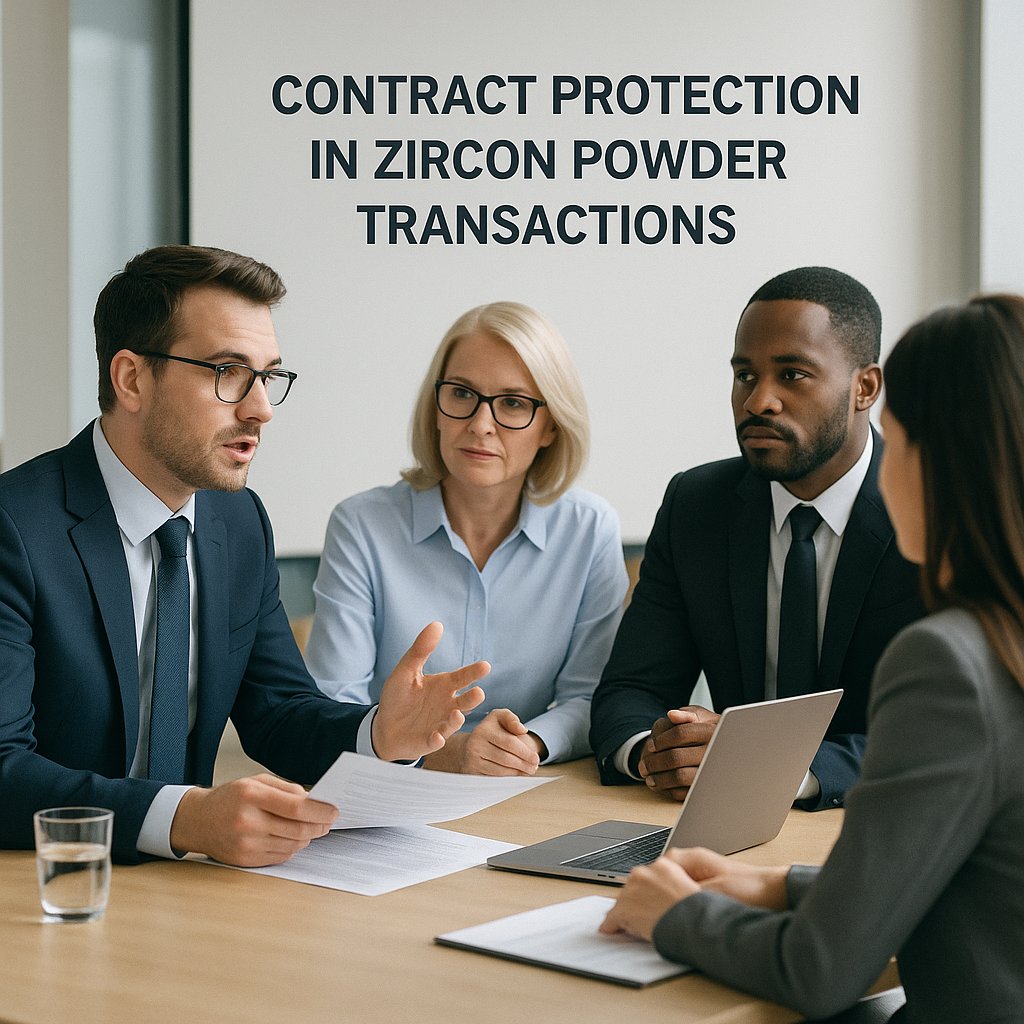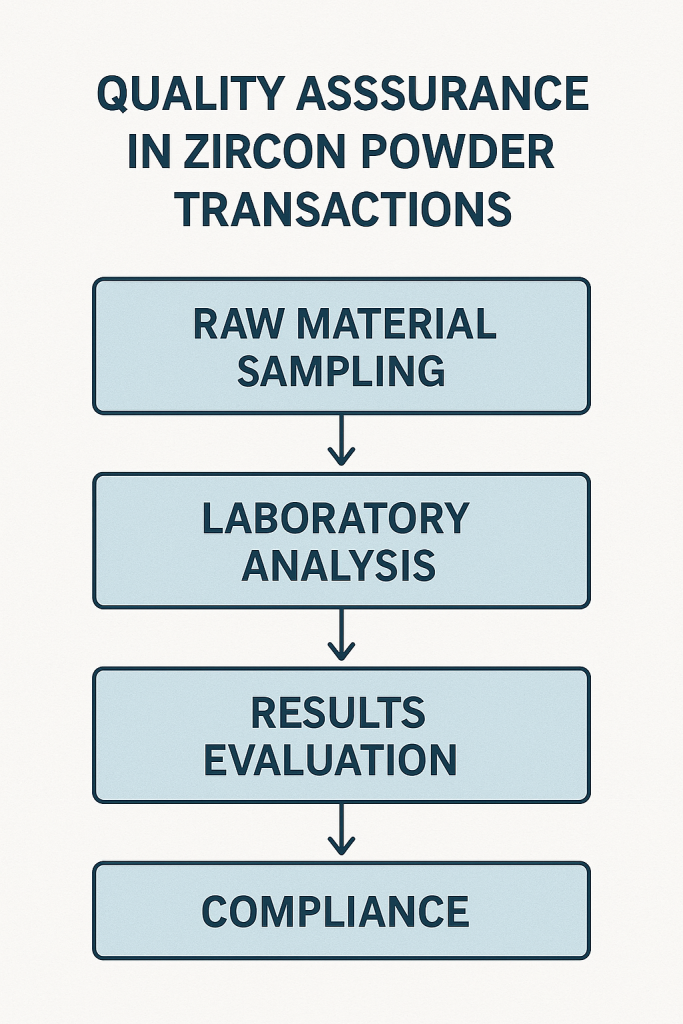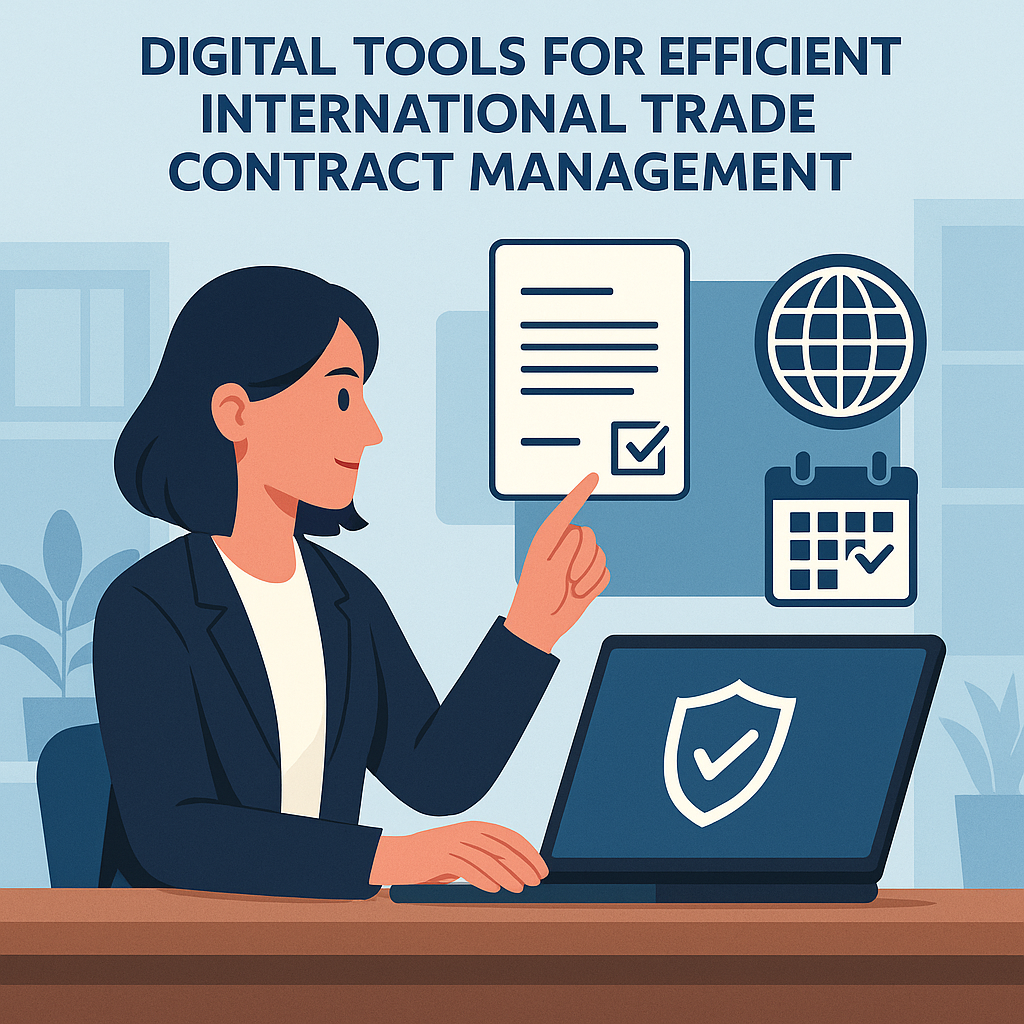Finding the right contractual protections in zircon powder transactions can make the difference between a successful deal and a potential disaster. Buyers often face challenges related to quality assurance, delivery timelines, and compliance with international regulations. Without clear contractual terms, these challenges can turn into costly problems. This article provides actionable insights into the key protective measures buyers should include in their contracts. By addressing these vital areas, you can secure your interests and navigate the complexities of international transactions with greater confidence. Trust us to guide you through best practices that can help safeguard against risks associated with zircon powder deals.

This image depicts a business meeting where professionals discuss contractual protections in zircon powder transactions.
What Are the Key Considerations for Buyers in Zircon Powder Transactions?
When entering into zircon powder transactions, buyers must consider several critical aspects. First, understanding market trends and dynamics is essential for making informed decisions. Buyers should research the demand for zircon powder and the factors affecting its pricing. This understanding will empower them to negotiate better terms.
Next, identifying credible suppliers is vital. A thorough vetting process helps buyers ensure that they engage with trustworthy partners. This can include checking references, evaluating previous transaction histories, and confirming production capacity. A well-documented supplier verification process fosters confidence and reduces risk.
Another key consideration is evaluating quality standards and specifications. Buyers should establish clear guidelines as to what constitutes acceptable quality. This may involve defining parameters such as purity levels, particle size, and additional chemical properties. By setting these standards upfront, buyers can avoid disputes later on.
By taking these considerations into account, buyers position themselves to navigate the complexities of zircon powder transactions effectively.
| Contractual Aspect | Key Points to Include |
|---|---|
| Payment Terms | Methods, currency, timelines |
| Delivery Timelines | Proposed dates, shipping responsibilities |
| Dispute Resolution | Mediation, arbitration procedures |

This image illustrates the quality assurance process for zircon powder testing to ensure compliance with standards.
What Types of Contractual Terms Should Buyers Include?
In any international transaction, it is crucial for buyers to include specific contractual terms. These terms lay the groundwork for a successful cooperation between both parties.
Payment terms and conditions are among the most significant aspects of a contract. Buyers should clearly specify payment methods, currency, and any timelines for payments.
Delivery timelines and logistics are equally paramount. Buyers need to define when and how the zircon powder will be delivered. It is important to consider logistics such as shipping methods and who bears the costs at various points in the transaction.
Dispute resolution mechanisms should also be outlined. In the event of a disagreement, having predefined procedures for mediation or arbitration can help both parties resolve issues promptly and efficiently.
Overall, including these key contractual terms creates clarity, reduces misunderstandings, and protects both parties involved in a transaction.
| Contractual Aspect | Key Points to Include |
|---|---|
| Payment Terms | Methods, currency, timelines |
| Delivery Timelines | Proposed dates, shipping responsibilities |
| Dispute Resolution | Mediation, arbitration procedures |
How Do Incoterms Affect Zircon Powder Transactions?
Incoterms, or International Commercial Terms, play a significant role in international trade by defining the responsibilities of buyers and sellers. These terms dictate how logistics costs, risks, and responsibilities are shared. Understanding Incoterms is crucial for buyers involved in zircon powder transactions.
For example, under the Free On Board (FOB) term, the seller is responsible for transporting the goods to the port and loading them onto the ship. The buyer then assumes responsibility once the goods are on board. This clearly delineates responsibilities, which reduces liability for both parties.
In contrast, the Cost, Insurance, and Freight (CIF) term includes the shipping cost and insurance to the destination port. It places more responsibility on the seller. Buyers should carefully choose the most suitable Incoterm based on their preferences for risk management and control over logistics.
Navigating Incoterms correctly can save both time and costs while fostering a successful trading partnership.
| Incoterm | Responsibilities | Buyer’s Control |
|---|---|---|
| FOB | Seller handles transport to port | Limited |
| CIF | Seller manages shipping & insurance | Greater |
Why Are Quality Assurance Clauses Vital in Contracts?
Quality assurance clauses are essential in contracts, especially for products like zircon powder, where quality can significantly impact processes. These clauses set expectations and requirements for quality control.
Firstly, it is important to outline specific quality control measures. If buyers set criteria for purity, particle size, and consistency, suppliers can better understand the quality expectations. This specificity reduces the likelihood of disputes regarding product failure.
Secondly, contracts should dictate testing and compliance standards. Including details about who performs quality testing and what certifications are needed ensures that the products meet industry standards. Buyers benefit from establishing accountability.
Lastly, clauses outlining recourse for quality-related disputes should be included. Buyers should clearly state what happens if the quality falls short. This might involve penalties, returns, or replacements, thus providing security for your investment.
Incorporating quality assurance clauses can create a solid framework for protecting buyer interests throughout the transaction process.
| Quality Control Detail | Importance |
|---|---|
| Specific Criteria | Reduces disputes on product failure |
| Testing and Compliance | Ensures standards are met |
| Dispute Resolution for Quality | Provides security for buyer investment |
What Role Does Intellectual Property Play in Zircon Powder Contracts?
Intellectual property (IP) concerns can arise in zircon powder transactions, particularly regarding formulations and production technology. Buyers must address IP rights in their contracts to maintain a competitive advantage.
It starts with understanding what IP rights exist around the zircon powder. For instance, if a supplier uses proprietary technology or formulations, buyers need to ensure these are protected. Including a clause that safeguards these rights protects buyers from potential exploitation.
Additionally, protecting proprietary technologies used in production is crucial. If the buyer has special processes or formulations, these should be clearly defined in the contract to prevent misuse.
Lastly, IP considerations can also affect the negotiation process. Understanding the implications of IP rights helps buyers negotiate terms that align with their strategic interests.
Being proactive about IP rights can enhance the value of contracts and protect both parties’ innovations.
| IP Aspect | Key Points for Buyers |
|---|---|
| IP Rights | Clarify ownership and protection |
| Proprietary Technologies | Define and safeguard buyer innovations |
| Negotiation Implications | Understand how IP affects terms |
How Can Buyers Ensure Compliance with International Regulations?
Compliance with international regulations is a critical consideration for buyers of zircon powder. Different countries have varying laws, and understanding these is necessary to avoid penalties.
To start, buyers should familiarize themselves with applicable regulations. These may include import/export regulations, customs duties, and trade agreements. Knowledge of these factors is essential for smooth transactions.
Best practices for adherence involve conducting thorough due diligence on suppliers. Buyers should confirm that suppliers comply with all necessary regulations. This knowledge can protect against fines or product seizures.
Buyers may also want to implement training programs to ensure staff are aware of relevant regulations. This proactive approach reduces the likelihood of errors and promotes a compliance-focused culture.
With compliance being a fundamental aspect of international trade, taking these steps can safeguard your operations and ensure smooth transactions.
| Compliance Area | Key Actions for Buyers |
|---|---|
| International Regulations | Research applicable laws |
| Supplier Verification | Confirm compliance with regulations |
| Staff Training | Implement compliance-focused training |
How Do Currency Fluctuations Impact Pricing in Contracts?
Currency fluctuations can significantly affect the pricing of international transactions, including those involving zircon powder. Buyers should consider strategies to mitigate the risks associated with volatile exchange rates.
Understanding how exchange rates influence pricing is critical. A sudden shift can alter costs dramatically, affecting profit margins. Buyers should monitor currency trends and factor potential fluctuations into their pricing strategy.
Another effective method to manage currency risk is to include contract clauses that specify payment in a stable currency. Fixed exchange rates can provide protection against sudden changes in the market.
Buyers can also consider options like forward contracts. These allow them to lock in rates for future transactions, thus providing predictability in pricing.
By proactively addressing currency fluctuations, buyers can secure better pricing and protect their investments.
| Currency Management Strategy | Description |
|---|---|
| Payment in Stable Currency | Lock in costs to avoid fluctuations |
| Forward Contracts | Predict pricing for future transactions |
Why Is Seller Due Diligence Important Before Signing?
Prior to signing contracts for zircon powder transactions, conducting seller due diligence is crucial. This process helps buyers assess potential risks and make informed decisions.
One of the first steps in due diligence is vetting potential suppliers. Buyers should research their reputations, financial stability, and production capabilities. This information can help ensure they are partnering with reliable entities.
Additionally, evaluating operational practices is key. Buyers should inquire about suppliers’ quality management systems and adherence to industry standards. This assessment ensures that potential partners prioritize quality.
Lastly, looking for red flags during the due diligence process can save time and resources. Indicators such as poor communication or a lack of transparency might warrant further scrutiny.
A thorough due diligence process reduces the risk of partnering with unreliable suppliers, fostering better business relationships.
| Due Diligence Aspect | Key Focus Areas |
|---|---|
| Supplier Reputation | Research history and reviews |
| Operational Practices | Assess compliance with standards |
| Red Flags | Identify warning signs |
What Are Common Risks in International Zircon Powder Transactions?
Entering into international zircon powder transactions comes with various risks. Buyers must understand and mitigate these risks to safeguard their investments.
Market risks include fluctuations in demand and pricing. Buyers should continuously monitor market trends to anticipate changes.
Logistical risks encompass shipping delays and customs issues. Buyers can minimize these risks by working with trustworthy logistics partners and planning for potential setbacks.
It is also crucial to understand legal risks. Different countries have varying legal systems and regulations that can create complications. Buyers must ensure compliance with local laws to avoid costly penalties.
Insurance options should be considered as a protective measure against these risks. Policies designed for international transactions can provide additional security.
By being aware of these common risks, buyers can take proactive steps to protect their interests in international transactions.
| Risk Aspect | Mitigation Strategies |
|---|---|
| Market Risks | Monitor trends and adjust demands |
| Logistical Risks | Partner with reliable logistics providers |
| Legal Risks | Ensure compliance with local laws |
How Can Technology Improve Contract Management?
In today’s digital age, technology plays a vital role in enhancing contract management. Buyers can leverage various tools to improve efficiency and accuracy in their transactions.
Digital contract management tools can store and organize contracts for easy access. This means that buyers no longer have to sift through paperwork, saving time and reducing errors.
E-signatures also enhance the contract process. They allow for instant approval and reduce the need for physical presence, facilitating quicker transactions.
Data analytics plays an essential role too. Buyers can analyze trends in contract performance, enabling better negotiation in future deals.
Utilizing technology in contract management streamlines processes and builds stronger relationships with suppliers.
| Technology Solution | Benefits |
|---|---|
| Digital Contract Management | Organized contracts and easy access |
| E-Signatures | Faster approvals and reduced paperwork |
| Data Analytics | Informed negotiations and deal insights |
What Should Buyers Know About Amendments and Renewals?
Understanding the procedures for amendments and renewals is crucial for buyers engaging in zircon powder transactions. Contracts are dynamic documents that may need adjustments over time.
Buyers should be aware of the lifecycle of their contracts. As market conditions change, contract terms may require updates to reflect new realities.
Best practices involve clearly outlining terms for modification and renewal in the initial agreement. Buyers should specify how changes can be requested and who has the authority to approve them.
Legal considerations are important too. Buyers must understand the legal implications of contract amendments. Consulting legal professionals can ensure that all changes are valid and enforceable.
By taking time to understand these processes, buyers can manage their contracts more effectively, mitigating risks as they arise.
| Amendment/Renewal Aspect | Key Considerations |
|---|---|
| Lifecycle Awareness | Monitor and adjust contracts as needed |
| Modification Terms | Clearly outline the process for changes |
| Legal Implications | Ensure validity of all amendments |
How Can Buyers Prepare for Dispute Resolution?
Disputes can arise in any business transaction, including those involving zircon powder. By preparing for potential conflicts, buyers can handle them more effectively.
One effective strategy is to establish clear communication channels. Open dialogue can help address issues before they escalate into disputes.
Understanding the mediation and arbitration processes is also key. Buyers should know how these procedures work and what steps to take if a disagreement arises.
Effective communication during disputes is vital. Buyers should document all correspondence regarding the conflict, which can serve as evidence if needed.
Lastly, knowing the legal avenues for enforcement can provide additional security. Buyers should consult legal experts to understand their rights and options in dispute situations.
Preparing for dispute resolution can minimize disruptions and protect interests during challenging situations.
| Dispute Preparation Strategy | Key Actions |
|---|---|
| Establish Communication | Create open channels for dialogue |
| Understand Processes | Familiarize yourself with resolution methods |
| Document Correspondence | Keep clear records of communication |
Conclusion
In summary, understanding the complexities involved in zircon powder transactions is crucial for buyers. Securing appropriate contractual protections can mitigate risks, enhance compliance, and build stronger supplier relationships. Establishing clear terms upfront is a sound strategy that pays off in the end. By following the insights provided in this article, you are taking the first step towards more secure and effective transactions in this market.

This image showcases digital tools that enhance the efficiency of contract management in international trade.
At Global Industry, we are here to support your business needs. Reach out to our experts for more assistance on best practices for contractual agreements and how they can be tailored to fit your specific needs.
FAQ Section
Q1: What are the key benefits of having contractual protection in place?
Having contractual protection in place safeguards buyers from potential losses and uncertainties. It clearly outlines the rights and responsibilities of both parties, reducing misunderstandings that can lead to disputes. Contractual protections also establish recourse mechanisms, meaning if one party fails to meet their obligations, the other has defined actions they can take to seek remedy. This builds a sense of security and trust in the business relationship, allowing both parties to focus on their operational goals without fear of unexpected challenges.
Q2: How often do payment terms vary in international transactions?
Payment terms can vary significantly based on factors such as trust between parties, the economic climate, and industry practices. In some cases, suppliers may request upfront payments to mitigate their risk, especially if they are less familiar with the buyer. Alternatively, established relationships may lead to net payment terms, allowing buyers to pay after receiving goods. It’s essential for buyers to negotiate favorable terms that align with their cash flow requirements while also considering the supplier’s need for security.
Q3: What are the most common Incoterms used for zircon powder transactions?
Commonly used Incoterms in zircon powder transactions include Free On Board (FOB) and Cost, Insurance, and Freight (CIF). FOB indicates that the seller is responsible for delivering the goods to the port and loading them onto the ship, after which the risk shifts to the buyer. CIF, on the other hand, obligates the seller to cover costs and insurance for goods until they reach the buyer’s port. Understanding these terms is crucial because they define who bears risk and costs at each stage of transport, influencing overall expenses and responsibilities.
Q4: How can buyers verify the quality of zircon powder?
Buyers can implement several methods to verify the quality of zircon powder before accepting a shipment. Requesting certified laboratory analyses can provide data on the chemical composition and physical properties of the product. Conducting pre-shipment inspections allows buyers to physically examine the goods and confirm they meet agreed-upon specifications. Additionally, buyers should negotiate clauses in their contracts that allow for quality checks upon arrival, ensuring that they have recourse if the product does not meet the set standards.
Q5: What steps should a buyer take if a dispute arises?
If a dispute arises, the buyer should first attempt to communicate informally to resolve the issue. Clear and calm communication may help clarify misunderstandings. If informal attempts fail, engaging in mediation is often the next step, where a neutral third party helps facilitate a solution. Buyers must document all aspects of the dispute thoroughly, as this documentation may be crucial if the situation escalates to arbitration or legal action. It’s advisable for buyers to consult legal professionals to understand their options and ensure they preserve their rights throughout the dispute resolution process.




